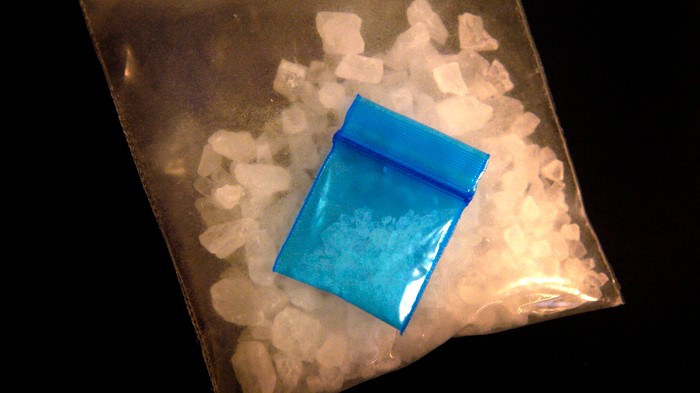source:
https://www.vice.com/en_uk/article/n7jdd8/uk-british-dont-use-methsee the source for links
Why People in the UK Don't Use Meth19 February 2020
The drug is pervasive in the United States. Why hasn't it gained a foothold in Britain?
In the past month, more than a million Americans have used meth. The drug is pervasive in the U.S., sometimes made in amateur labs in drug-scarce midwestern states or, more commonly, imported in bulk by Mexican cartels. Meth use is unprecedentedly high in other parts of the world too, most notably in Asia and Australia, but also in some parts of Europe such as the Czech Republic.
But in Britain, the drug is super niche compared to almost every other substance. Government data shows that last year almost a million people took powder cocaine, while just 11,000 took meth. More than one in 10 adults have used cocaine; only five in every 100 has ever used meth. The U.K.’s Home Office drug seizure data does not even include meth, because the amounts seized are so small.
Despite a series of false alarms over the last 15 years about Britain being invaded by meth, why has the drug never gained a foothold there? And what does this say about the U.K.—and in turn about the U.S.?
The answer starts with geography and supply.
Even though Britain does have its fair share of remote countryside, compared to the U.S., it’s a small, well-populated and well-connected country. One of the reasons meth became so prevalent in rural America, Australia, and New Zealand was because these places were not served well by big-city stimulant dealers. So they decided to cook up their own stimulant, crystal meth.
Meanwhile, Britain is a lucrative little pocket of drug use in the global drug trade. Crucially, it is a short hop from Holland, where a huge amount of meth’s rival stimulant drugs—MDMA, speed and cocaine—are either produced or imported.
Holland synthesizes the majority of stimulants in the EU, with dozens of labs pumping out millions of doses of MDMA and amphetamines each year. These cater to an insatiable British appetite for party drugs. Amphetamine base, or sulphate, is cheap in the U.K. (though it is often heavily cut with caffeine). With cocaine production and output in Colombia hitting record levels in 2018, there is now an abundance of inexpensive, high-potency cocaine feeding into the U.K. market, often via importation through Spain, Holland, and Belgium.
The prevalence of low-cost, uncut cocaine and MDMA explain British users’ reluctance to switch drugs, said Harry Sumnall, a professor who studies substance use at Liverpool John Moores University in the U.K. “If people are after a stimulant, then the high purity, widespread availability and low price of cocaine and ecstasy make these much more attractive options,” he said.
Ten years ago in the U.K., MDMA supplies dried up and the credit crunch devalued the pound by 25 percent, making cocaine more expensive to import. Even then, the U.K. did not turn to meth, possibly because at the time it cost a steep £150 per gram. Instead, Brits took to a new high called mephedrone, which was cheap, legal (at the time), and readily available online.
Today, MDMA is cheaper and stronger than ever, and cocaine has never been purer, cheaper, or more easily available. So there is simply no need for meth in the U.K.
Nor is there much of an appetite for it.
While it has found an audience among affluent gay men on the “chemsex” scene, to most British drug users, the longer-lasting high is not as desirable as the shorter high of coke. If a high is going to last, the Brits appear to want it to have a psychedelic tinge, as with MDMA.
“Meth doesn’t make you want to dance,” said Stewart Who?, a DJ and writer who first noted the arrival of meth in U.K. gay scenes in 1997. “It arouses the opposite vibes of drugs such as MDMA, and even cocaine: no community, no love, just twitchy, paranoid, very awake people. The long-lasting aspect is very inconvenient: Nothing good happens after you’ve been awake for three days.”
Perhaps America’s 1990s meth epidemic also acted as a sort of drug scarecrow for the U.K., giving the drug a bad rep. “Meth has always felt like a very serious substance, due to the main routes of administration, smoking and injecting. It puts people off,” said Nick Hickmott, a drug worker for the charity Addaction.
Sumnall agrees that media representations of desperately ill meth users in the U.S. have had an impact in the U.K. “As we have no history of use in the U.K., then a lot of perceptions of meth are based on media representations from the USA and elsewhere, and this has tended to be negative. “Methamphetamine is a rare example of a drug where negative media representations have actually had a preventive effect—something that rarely happens in those countries where there is already use,” he concluded.
He said the existing drug markets in the U.K. are so well-established that diversification makes little sense from a drug dealer’s perspective. “There’s no real incentive for organized criminal enterprises to diversify into methamphetamine when their existing product range is so profitable. Who wants to inject or smoke a drug, when ‘clean,’ culturally relevant, and more normalized stimulants are already here and engrained in popular culture?”








